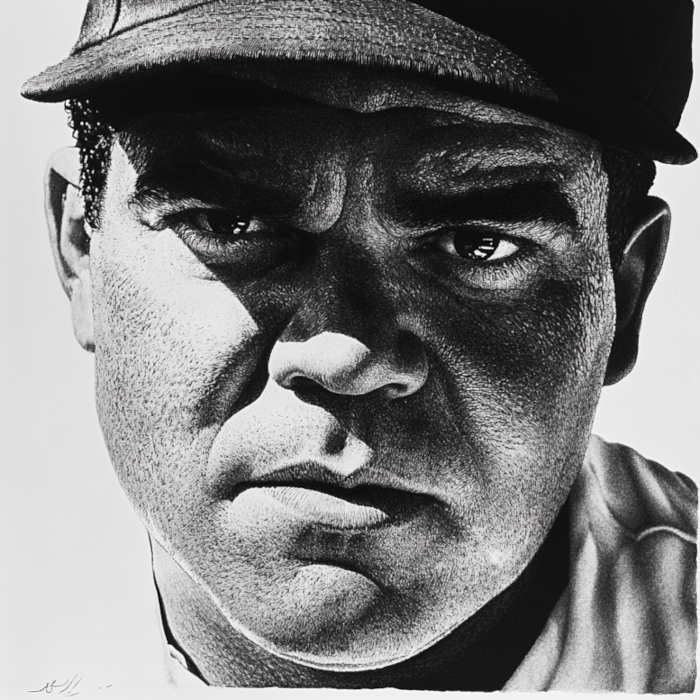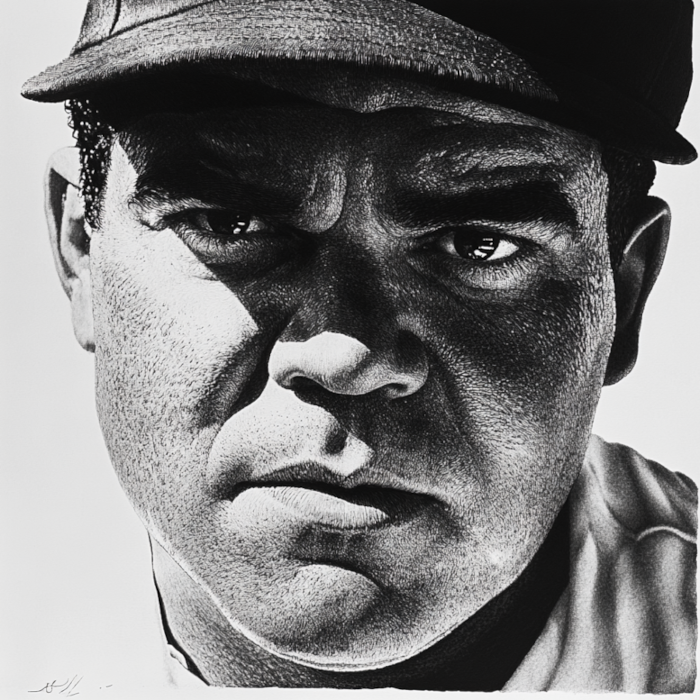


Babe Ruth (1895–1948), born George Herman Ruth Jr., is widely regarded as one of the greatest baseball players of all time. Nicknamed "The Sultan of Swat," "The Bambino," and "The Colossus of Clout," Ruth's extraordinary hitting prowess and larger-than-life personality transformed the game of baseball and made him a national icon in the United States. His impact on the sport was so profound that he is often credited with ushering in baseball's "live-ball era" and elevating the popularity of the game to unprecedented levels.
Birth and Childhood: Babe Ruth was born on February 6, 1895, in Baltimore, Maryland, to George Herman Ruth Sr. and Katherine Schamberger. His early childhood was challenging; his parents struggled to provide stability, and Ruth often found himself in trouble. At the age of seven, his parents sent him to St. Mary's Industrial School for Boys, a reformatory and orphanage where he spent most of his youth. It was at St. Mary's that Ruth first developed his love for baseball, under the guidance of Brother Matthias, a mentor who recognized Ruth's talent and encouraged him to pursue the sport.
Baseball Beginnings: Ruth quickly became known for his prodigious hitting and pitching abilities at St. Mary's. By the time he was a teenager, his baseball skills had attracted the attention of professional scouts. In 1914, at the age of 19, Ruth was signed by the Baltimore Orioles, a minor league team at the time. His impressive performance soon caught the eye of the Boston Red Sox, who purchased his contract later that year.
Pitching Success: Babe Ruth began his major league career as a pitcher for the Boston Red Sox. Between 1914 and 1919, Ruth established himself as one of the best left-handed pitchers in the league. He had a remarkable ability to control the game, with a powerful fastball and a sharp curveball. During his time with the Red Sox, Ruth helped the team win three World Series titles (1915, 1916, and 1918).
Transition to Hitting: While Ruth was an outstanding pitcher, his true talent lay in his hitting. In 1918, Red Sox manager Ed Barrow began to play Ruth in the outfield on days when he wasn't pitching, allowing him to showcase his batting skills. Ruth quickly became known for his ability to hit home runs, a relatively rare feat in the "dead-ball era" of baseball, where games were dominated by low scores and small-ball tactics.
The Sale to the Yankees: In December 1919, in what is now considered one of the most infamous transactions in sports history, the Boston Red Sox sold Babe Ruth to the New York Yankees for $100,000, a significant sum at the time. The sale was driven by Red Sox owner Harry Frazee's financial difficulties and desire to fund his theatrical productions. This move marked a turning point in both Ruth's career and the history of baseball.
Dominance with the Yankees: Ruth's impact on the Yankees was immediate and transformative. In 1920, his first season with the Yankees, Ruth hit a staggering 54 home runs, more than any other team in the league, and set a new single-season home run record. He followed this up with 59 home runs in 1921. Ruth's prodigious power and charisma helped turn the Yankees into a dominant force in baseball, and they soon became the most successful franchise in the sport.
Home Run King: Babe Ruth's ability to hit home runs changed the way baseball was played. His exploits helped usher in the "live-ball era," where the emphasis shifted from small-ball strategies to power hitting. Ruth's 60 home runs in the 1927 season set a new single-season record, a mark that would stand for 34 years. Over the course of his career, Ruth hit 714 home runs, a record that stood until 1974 when it was broken by Hank Aaron.
World Series Success: Ruth's dominance with the Yankees led to unparalleled success for the team. Between 1923 and 1932, Ruth helped the Yankees win four World Series titles (1923, 1927, 1928, and 1932). The 1927 Yankees, often referred to as "Murderers' Row," are widely regarded as one of the greatest teams in baseball history, with Ruth leading the way alongside other stars like Lou Gehrig.
Cultural Icon: Beyond his on-field achievements, Babe Ruth became a cultural icon in the United States. His larger-than-life personality, his love of the spotlight, and his ability to captivate fans made him one of the most famous and beloved figures of his time. Ruth's fame extended beyond baseball; he became a symbol of the Roaring Twenties, representing the spirit of excess and celebration that characterized the era.
The Curse of the Bambino: After the Red Sox sold Ruth to the Yankees, the Red Sox experienced an 86-year championship drought, which became known as the "Curse of the Bambino." Many fans believed that the sale of Ruth was the cause of the Red Sox's long run of misfortune, a superstition that persisted until the team finally won the World Series in 2004.
Influence on the Game: Babe Ruth's influence on baseball is immeasurable. He redefined the role of the home run in the game and set the standard for future generations of power hitters. Ruth's success also contributed to the rise in popularity of baseball in the United States, helping it solidify its status as America's pastime.
Final Seasons: Ruth's performance began to decline in the early 1930s as he aged and struggled with health issues. In 1935, after a brief and unremarkable stint with the Boston Braves, Ruth retired from professional baseball. Although he had expressed interest in managing a team, no major league club offered him a managerial position, a disappointment that Ruth carried with him until his death.
Legacy and Honors: After retiring, Ruth remained a beloved figure in American culture. He was one of the first five players inducted into the Baseball Hall of Fame in 1936. Ruth's legacy continued to grow after his death, and he remains an enduring symbol of excellence in baseball.
Death: Babe Ruth was diagnosed with throat cancer in 1946, a disease that took a toll on his health. He underwent several treatments, including experimental therapies, but his condition worsened. Ruth passed away on August 16, 1948, at the age of 53, in New York City. His funeral at St. Patrick's Cathedral in Manhattan was attended by thousands of fans, a testament to his impact on the sport and American culture.
Enduring Legacy: Babe Ruth's influence on baseball and American culture is profound and enduring. He remains a central figure in the history of the sport, and his records, achievements, and larger-than-life persona continue to inspire generations of athletes and fans. Ruth's name is synonymous with baseball greatness, and his contributions to the game have left an indelible mark on sports history.
Babe Ruth was more than just a baseball player; he was a transformative figure whose impact on the game and American culture is unparalleled. His extraordinary talent, charisma, and larger-than-life presence helped shape the modern era of baseball and cemented his status as one of the most iconic athletes in history. Ruth's legacy as a pioneer of the "live-ball era," a home run king, and a cultural icon continues to resonate, making him a legendary figure in the annals of sports.

We use cookies
We use cookies and other tracking technologies to improve your browsing experience on our website, to show you personalized content and targeted ads, to analyze our website traffic, and to understand where our visitors are coming from. Privacy Policy.